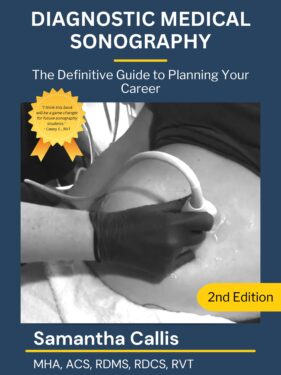In order to be a competitive candidate for a position in sonography, successful completion of an accredited ultrasound technician program is a must. Admittance to these programs is competitive, and before you begin your educational pursuit, it can be helpful to understand what types of sonography courses you might be required to take.
You must have a firm knowledge of biology, physics, technology, health and patient care to be a medical sonographer. As part of a certificate or ultrasound technician degree program, students have the chance to complete rigorous ultrasound courses in each of these subject areas.
Ultrasound Technician Course Requirements
Core ultrasound classes may be divided into pre-professional (or pre-requisite) courses and those related to the profession of sonography. While prerequisites vary from school to school, here are some examples of the common courses required to enter the degree program. Most programs require a minimum 2.5 GPA on these course requirements.
Prerequisite Ultrasound Courses
- Anatomy and Physiology
- College Algebra
- General Physics
- English Composition
- Biology (Anatomy & Physiology, Microbiology)
- Psychology/Sociology
- Medical Terminology
Many degree programs require that their applicants complete a certain number of documented job-shadowing hours in an ultrasound clinic or hospital. It is common for schools to include an Observational Hours verification form as part of their application packet. Many require a minimum of 30 observational hours in a Diagnostic Medical Sonography setting.
Associate of Science Degree in Sonography Courses
Here are some of the common courses you can expect to take as part of a two-year associate degree program:
- Principles of General Sonography
- Ultrasound Physics and Instrumentation
- Abdominal Scanning and Pathology
- Sonography Patient Care
- OB/GYN Scanning and Pathology
- Vascular Scanning
- Superficial and Small Parts Scanning
- Registry Review
- Clinical Internships and Labs
Bachelor’s of Science in Sonography
In addition to the basic sonography courses referenced above, Completion of the advanced courses necessary to obtain a bachelor’s degree will most likely include some of the following:
- Healthcare Ethics
- Introduction to Epidemiology
- Conflict Resolution in Healthcare
- Health Policy
- Ultrasound Physics
- Healthcare and Aging
- Academic and Professional Writing
There’s no doubt that ultrasound school is tough. Read first-hand accounts from some of our contributors on how they successfully navigated the process.
- How to Manage the Stress of Ultrasound School – Candice Sellers, B.S., RDMS
- Surviving…and Thriving in your Sonography Program – Adrienne Hardy, RDMS
Specializations & Concentration Tracks within Ultrasound
Some ultrasound degree programs allow students to specialize or concentrate in a particular area of ultrasound through extended coursework and focused clinical rotations. Some examples of common specializations are:
- General Ultrasound: This specialty includes abdominal sonography (i.e. the liver, spleen, kidneys, gallbladder and pancreas), obstetric sonography (ultrasounds of a developing embryo/fetus inside the mother’s uterus) and gynecologic sonography (ultrasounds of the female reproductive system).
- Cardiac and Vascular Ultrasound: Sonography of the heart and vascular system.
There are also a variety of non-clinical career paths available to working sonographers.
Continuing Education Requirements
Ultrasound techniques and equipment continue to become more advanced, just as the demand for sonographers continues to increase. As a result, sonographers need to and should continue their ultrasound training even after they’ve secured employment.
Not only can professional development help an ultrasound technician become more specialized and advance their career; to maintain certification (such as through the ARDMS or CCI), continuing medical education (CME) courses must be completed. It is important that the certifying agency approves of the institution offering the courses for it to count, but luckily numerous institutions and organizations offer advanced ultrasound courses are recognized.
The Society of Diagnostic Medical Sonography (SDMS), the Society for Vascular Ultrasound, the American Society of Radiologic Technologists and Sonography Canada are just some examples of approved CME providers.
Here are some great questions to ask a rep when researching a school or program:
Q: What are the requirements for being admitted into the sonography program?
Being eligible for an ultrasound program will vary by school and degree level. Some might only require a High School diploma; others the completion of a few college courses in areas such as Biology, Physics, Math or Medical Terminology; while some may prefer students who have already completed a two-year allied health or health science program.
Q: Does your school offer several options, like a degree and a certificate program?
Knowing all your options can help you determine which program is best for you based on past educational experiences and future career goals. Certificates are available to students who already have at least an associate’s of science degree in another discipline.
Q: Is your sonography program accredited? AND Will I qualify to sit for a national sonography certification exam once I graduate?
For example, when you complete an ultrasound program accredited through the CAAHEP (Commission on Accreditation of Allied Health Programs) it qualifies you to sit for the national registry certification exam offered by the ARDMS without having to do any extra clinical work after graduation. Plus, many ultrasound employers prefer potential sonographers to have completed an accredited program.
Q: What type of sonography facilities are used as part of the program?
You will need to have quality hands-on experience using up-to-date ultrasound equipment to complement what you learn in the classroom. This will help prepare you for clinical internships and your career.
Q: How many clinical rotations are there and where will they be held?
Ideally you would like to complete more than one clinical internship at a real-world facility. Getting an idea of where your on-the-job experience might take place is also a good idea. Is it a hospital or reputable medical centre/healthcare facility? Is it convenient for you to get there?
Q: Does your school have articulation agreements with other colleges/universities?
Basically you’re asking if they have formal agreements with other schools where you could transfer credits towards a higher degree (such as transferring credits from an Associate’s degree in Diagnostic Medical Sonography towards a Bachelor’s).
Q: What types of resources/services do you offer students?
You can ask about such things as the availability of academic support/tutoring centers for sonography courses, financial assistance and scholarships, one-on-one academic advising and extracurricular clubs.
Q: What makes your school’s ultrasound or sonography program different than others?
Encourage the rep to describe all of the program’s best features. Are the instructors and faculty experienced? Has the program won any awards? Are there areas that have been improved? Are there opportunities for me to concentrate in ultrasound specialties?
Q: What is your career/job placement track record?
It is important that prospective schools are able to provide you with accurate data on their graduates’ success rate on securing employment. Equally ideal is that the school offers career counseling and employment services, like job search and resume writing assistance, recruiting events, employer networking opportunities, interview and other skill-based workshops and the like, for students and alumni.
Q: Can some classes be taken online?
If you are just starting your sonography degree or educational program, a portion of your ultrasound training has to take place in person for hands-on experiences in the lab and clinical internships. But there are some hybrid ultrasound programs, particularly at the Bachelors and Masters levels, that offer theoretical courses online and practical ultrasound classes in person.
If you are completing a higher level degree and have already completed clinical hours as part of an Associate degree program, for example, in some cases all ultrasound courses can be completed online. Also institutions that offer advanced ultrasound classes offer several of them online.
Q: I struggle with Physics and Science Courses. Am I still a good candidate for ultrasound programs?
Possibly. If you struggled with sciences in high school, it does not disqualify you from being a successful ultrasound technician. While physics and science classes can be challenging, and are an important part of an ultrasound program, they are not the only emphasis of the ultrasound curriculum. The physics, biology and medical courses you will be taking will directly pertain to the field of sonography. As you complete experiential labs, it will help you understand what you have been reading in a scientific text book. Plus, there is an emphasis on study groups within an ultrasound program, so you and your classmates can help one another understand certain areas you may find difficult. As you complete your clinical internships, perhaps the most educational component of your program, you will understand the science behind ultrasound more profoundly.
Q: How important is it to choose an accredited ultrasound program?
It is extremely important. An ultrasound program accredited through the CAAHEP means its faculty, facilities and curriculum meet quality standards. Completing such a program is highly preferred by many future employers and is the easiest way to qualify for professional certification after graduation. Learn more on how to choose an ultrasound training program.
Q: What does “clinical” mean as in “clinical training,” “clinical hours” etc.?
A clinical internship, practicum or rotation is a vital component of every quality ultrasound technician training program. Students gain clinical hours through gaining hands-on experience working side-by-side with experienced sonographers and other healthcare or medical professionals. Depending on the ultrasound school, students complete one to several placements at a hospital, medical center or other relevant facilities. Many ultrasound schools also have on-site labs so students gain hands-on experience before setting out on their clinical rotations.
Other pages you might like:
- A Student’s Perspective – A student shares her experience
- Continuing Medical Education – Read about CME requirements
- Healthcare Career Tips – Discover why it’s a smart career move to learn a second language


 For example, if a laboratory course is 2 contact hours per credit hour, that would be 6 hours of contact time for the week, or for example, if a clinical course is 6 contact hours per credit hour, the SONO126 Clinical Experience would be 24 hours each week. That is a big difference if you were expecting to only be in clinical four hours a week!
For example, if a laboratory course is 2 contact hours per credit hour, that would be 6 hours of contact time for the week, or for example, if a clinical course is 6 contact hours per credit hour, the SONO126 Clinical Experience would be 24 hours each week. That is a big difference if you were expecting to only be in clinical four hours a week!